How will Donald Trump’s foreign policy affect the world?

Trump became the second person ever to become the president of the United States twice in non-consecutive terms, and the first convicted felon to be president. Running for a third time, he also won the popular vote this cycle—which he claimed in his victory speech as a "historic mandate" given to him by the American people, with Republicans taking control of the Senate as well. Although this brings a time of reflection for the polarised country as well as the Democratic Party—which hasn't faced such a vacuum in its leadership in over 20 years—the question of what it will mean for the rest of the world is something that has been widely speculated on, especially in regard to China.
China has been at the forefront of Trump's narrative during the election campaign, just as it was in the previous one. Trump has maintained a strong rhetoric, blaming China for economic abuses and promising to impose tariffs. This has been extremely controversial with economists arguing that the real cost will be passed down to the consumers as the tariffs will end up leading to persistently higher prices with minimal impact on the exporters themselves. During his previous presidency, Trump began a trade war with China that he hopes to reenact at a greater order, even going as far as to float the idea of replacing federal personal income tax with import tariffs. China itself battles economic woes, although its government maintains that it will continue to work with the US on the basis of mutual respect.
But markets reacted quickly and accordingly to Trump's victory, with the yuan taking a dive against the dollar. Furthermore, Trump's previous secretary of state announced in 2020 that it had rejected Beijing's maritime claims in the South China Sea, boosted US Navy patrols in the Taiwan Strait, and increased arms sales to Taiwan. But he continued to maintain the bizarre claim that the island should pay for US protection. His transactional view of allies—who are seemingly not paying their fair share—is extended to NATO as well.
During his first term, Trump frequently criticised various members of NATO for being "delinquent" and having failed to meet the two percent defence spending threshold. In 2020, Trump reportedly told European Commission President Ursula Von Der Leyen that "NATO is dead." During this campaign, he recounted a story of telling a NATO member country, "You didn't pay? You're delinquent," adding that he would not protect them in case Russia invaded. He went on to even say, "In fact, I would encourage them to do whatever the hell they want. You gotta pay. You gotta pay your bills." His comments received sharp rebuke from NATO Secretary-General Jens Stoltenberg, who said that such rhetoric undermined the security of the entire alliance, including the US and its soldiers.
Congress does have a guard rail to prevent the NATO-sceptic president-elect from leaving NATO, but as Politico has reported recently, he does have a way around it. In 2023, senators Tim Kaine and Marco Rubio authored a legislation that requires that any presidential decision to exit NATO must have either two-thirds Senate approval or be authorised through an act of Congress—and this was passed as part of the FY2024 National Defense Authorization Act. President Joe Biden signed it into law. But Trump has used presidential authority to bypass congressional restrictions on foreign policy decisions, such as treaty withdrawals. According to legal scholars, if he declared that he was pulling out of the alliance, it's unclear whether Congress would be able to legally stop him. So the possibility remains that he would not hesitate to take this route, but the question is whether he would actually want to.
With Donald Trump, everything is an assumption based on what he says. But as he showed with the national abortion ban during his campaign, he can switch when his policies become too popular. On the other hand, as the first Trump presidency showed, he can also go against his cabinet to make a decision.
Trump's general disdain for multilateral cooperation also extended beyond NATO, most famously manifesting itself in the form of the US pulling out of the Paris Agreement on climate change during his first term. This time, too, he has called the climate crisis "one of the great scams," while promising to increase fossil fuel production and exiting the agreement for the second time. On November 11, at COP29, the current US climate envoy, under the Biden administration, vowed that the US would tackle climate change "with commitment and passion and belief," despite Trump's victory. Trump has recently picked Stephen Miller, a longtime Trump immigration aide and a staunch public critic of the Paris Agreement, as deputy chief of staff for policy in the White House.
During his victory speech, Trump notably thanked his ally, environmental lawyer Robert F Kennedy Jr, and said, "Bobby, leave the oil to me…We have more liquid gold than any other country in the world." Trump further aims to annex Biden's flagship climate policy, which provides tax credit and subsidies for clean energy products and electric vehicles. His plan to bring down inflation is backed by promises of removing delays and bureaucratic hurdles to fossil fuel production. He hopes to "unleash" the US's energy supply, increase domestic drilling, and make the country energy-independent. His policy sharply differs from the Biden administration, which has pushed for clean energy and led the world in transitioning to renewable energy, even rejoining the Paris Agreement on his first day in office. Trump is expected to roll back on almost all of the Biden-era climate policies and pursue his concept of the "America First" policy.
A hallmark of the "America First" policy has been the removal of aid to any nation that won't benefit the US directly, including Ukraine. This is feared by the Biden administration, which has rushed to push more security assistance, worth billions of dollars, to Ukraine ahead of Trump taking office. Under Biden, the US government has committed some $174 billion in aid to Ukraine as it continues to battle Russian, while Republicans—not just Trump—have expressed strident criticism of it. With the Republicans cinching what can almost be regarded as "unified power" in the US, the stakes are high for Ukraine. Nevertheless, assumptions must not be conclusive as the president-elect is hardly, and very rarely, predictable. In the upcoming meeting that Joe Biden has called with Donald Trump for the transition of power, it is reported that the current president will try to push the future president to back Ukraine, with the pitch that walking away from Ukraine means walking away from Europe.
Trump has also continued to vow to end the war in 24 hours without providing any specifics as to how he plans to do so, extending the rhetoric to the Middle East. He had promised to bring peace without delving into any possible ways into exactly how or what his plans entail. Regarding Gaza, the rhetoric that "Trump will end all wars" seems to have factored into the choice of many Americans, as demonstrated by public Q&As by Congresswoman Alexandria Ocasio-Cortez—though the fact is not significantly proven, as the economy inarguably played the largest role in Trump's win and Kamala Harris's loss. But it's important to note that Donald Trump shares a cosy relationship with Benjamin Netanyahu as well as extremists in the Israeli cabinet, who reacted with joy to Trump's victory. The signs of the war worsening, especially for Palestinians, are already showing. Prime Minister Netanyahu has appointed Yechiel Leiter to be Israel's new ambassador to the United States. Leiter is a prominent advocate of formally annexing the West Bank, where occupation skyrocketed since Trump greenlit Netanyahu's annexation policy during his first administration.
With Trump's victory, the world is potentially looking at a foreign policy shake-up. Though we can gauge what will happen from Trump's rhetoric and past actions, much of what is to be seen remains uncertain. The president-elect did indeed go head-to-head with Iran, but he did stop when he needed to. Only time will tell what awaits for the rest of the world with a second Trump administration.
Mahadev Ghosh is an independent researcher based in the UK.
Views expressed in this article are the author's own.
Follow The Daily Star Opinion on Facebook for the latest opinions, commentaries and analyses by experts and professionals. To contribute your article or letter to The Daily Star Opinion, see our guidelines for submission.

 For all latest news, follow The Daily Star's Google News channel.
For all latest news, follow The Daily Star's Google News channel. 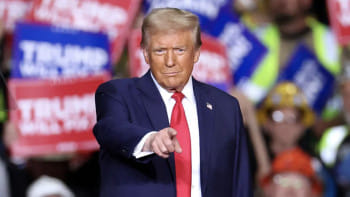

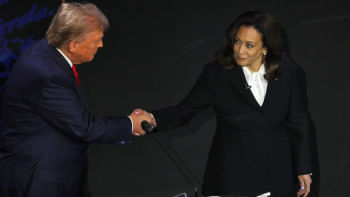


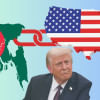


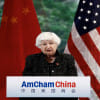
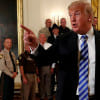


Comments